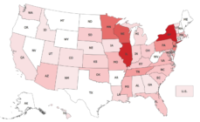 Despite a bit of early angst in a few states, 2018 ended up being a relatively benign year for public notice.
Despite a bit of early angst in a few states, 2018 ended up being a relatively benign year for public notice.
PNRC has tracked about 160 separate public notice bills this year, just a bit more than in 2017. Only 24 were enacted into law and most were vanishingly minor. As is generally the case with minor public notice legislation, almost all of the notice changes were incidental to the primary focus of the legislation. For example, a bill in New Jersey added several new instances of both newspaper and government website notice in connection with public-private partnership agreements for certain building and highway infrastructure projects.
[Click here for brief descriptions of several other minor public notice bills enacted in 2018.]
The two dozen bills that passed were evenly split between measures that will have a modestly positive impact on newspaper notice, and those that will be slightly unfavorable. The only significant loss occurred in Kentucky, where a bill was passed in the final hours of the session that allows school districts in the state to publish annual financial statements and report cards on their websites instead of newspapers. The new law also authorizes Louisville and Jefferson County, and Lexington-Fayette Urban County, to bypass newspapers by publishing audits, ordinances and bid solicitations on their own websites. The bill was vetoed by Republican Governor Matt Bevin but his veto was overriden by majorities of his own party in both chambers.
By contrast, the executive pen averted a fairly significant setback in Colorado, where Gov. John Hickenlooper vetoed a bill that would have allowed counties to publish employee salary reports, and separate semiannual financial statements and monthly expense reports, on their own websites in lieu of newspapers beginning in 2022.
Ten states considered legislation that would have eliminated or substantially reduced all newspaper notice, which was down from 22 states in 2017. Fortunately, only one of these ill-considered measures even saw the light of day. The exception was a bill in Missouri that would have allowed all public notice in the state to be published on a website operated by the secretary of state; it was reported out of committee before it died. Publishers in Missouri also faced some nervous moments over a bill that would have moved foreclosure notices in the non-judicial state from newspapers to mortgage-trustee websites. That bill also died after being reported out of committee.
